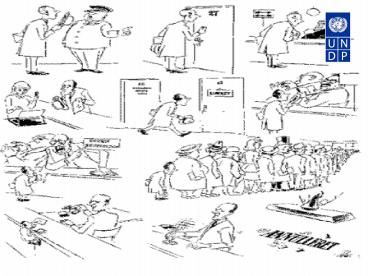Public Administration Reform Practice Note PowerPoint PPT Presentation
1 / 16
Title: Public Administration Reform Practice Note
1
(No Transcript)
2
Public Administration ReformPractice NotePart 1
- Global Practice Meeting on Public Administration
Reform
3
The Practice Note
- Provides a strategic framework for UNDP Country
Office staff and Regional Programmes for PAR
programming - Provides UNDPs development partners with clear
sense of UNDPs strategic focus - Provides a portal to more detailed programmatic
guidance toolkits including primers, case
studies other resources.
4
UNDP support for PARBasic statistics
- 380 projects in 112 countries
- 7 Promoting a professional, merit base, civil
service. - 17 Functional reviews
- 63 Training civil servants
- 13 ICT
5
PAR and the MDGs
- More resources in poor countries are freed to be
used in pursuit of MDG goals - By increasing transparency and eradicating
corruption, more scarce resources in poor
countries are directed towards achieving MDGs - A responsive public administration, especially to
women and marginalized people, is critical to
ensuring the sustainability of MDG achievements - Increasing the accountability of state
institutions is essential to closing the
democratic deficit.
6
Process of developing the PN
- Mapping of UNDP activities, lessons from
experience and evaluations - Inputs by the Democratic Governance Group, PAR
Advisers based in NY, Oslo and the SURFs. - Comments from Network Discussion between October
8th and October 22nd, involving over 20
participants. - Review by the Democratic Governance Programme
Team over 25 responses. - Peer review by senior practitioners in partner
agencies
7
Main issues in PAR for UNDP
UNDPs comparative strength is evolving
- Difficult to define a UNDP role compatible with
its resources. - Other players have increased their role in this
field, e.g. World Bank, ADB, IADB, and DfID - Surveys in Africa, Asia, and the Arab States have
shown that focus on reform of central government
declined while decentralization has become a core
area for UNDP
8
UNDPs Niche
- UNDPs twin pillars of a pro-poor and human
rights-based approach to PAR are a focus on open
government and decentralization - UNDP practitioners, informed by this Practice
Note and accompanying toolkit will be able to
engage in a dialogue on all aspects of PAR, and
be advocates for UNDPs pro-poor and human
rights-based approaches.
9
Substance and Scope of PAR
- The PN is built around capacity development at
the individual, institutional and societal levels
for poverty reduction in four areas - Civil Service Reform
- Improving the policy making system
- Reforming the machinery of government
- Reforming the public expenditure management
system
10
Civil Service Reform
- Mission
- Training
- Establishment control
- Management systems career vs. position civil
service commission performance management - Pay and compensation
- Gender equity and affirmative action
- Politicization and patronage
11
Improving the policy making system
- Growing area of interest
- Politically very sensitive
- Weakness one of the key handicaps to reform
12
Reforming the machinery of government
- Functional Reviews
- Information and Communication technologies and
e-governance - Democracy enhancing public institutions
13
Reforming the Revenue and Expenditure Management
System
- More often the preserve of the IFIs
- But important new approaches pro-poor budgeting
gender budgeting, etc. - Critical dimension of decentralization
14
PN provides practical guidance for DG
practitioners
Technical guidance on the main areas of PAR (Poli
cy making systems, CSR, etc.) as well as
- Entry points and sequencing
- Winners and losers
- Gaining support and fostering leadership
- Accounting for different administrative
traditions - Enshrining the Human Rights Approach
- Measuring Progress
15
Regional Trends
- RBA driven by structural adjustment and strong
donor pressure decentralization focus CSR
holistic approaches - RBAP UNDP increasingly crowded out shift
towards decentralization CSR, institutional
capacity building, public awareness and pro-poor
reform - RBAS few countries, focus on technical reforms,
anti-corruption, ICT - RBEC EU accession transitional economy issues
- RBLAC shift from focus on economic and
financial management (modernization) to more
ambitious approaches NPM, performance-based CSR,
and introducing voice
16
Next Steps
- Seminar on PAR in Bratislava to
- Build an understanding of and consensus behind
the positions espoused in the PN - Elaborate Primers such as
- Lessons from advances in PAR in Francophone
countries - Gender mainstreaming in PAR
- PAR in countries worst affected by HIV/AIDS
- Roll out the PN
- Enhance the guidance in the PN for a future

